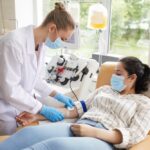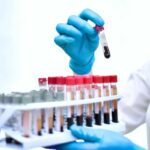The possibility of allogeneic “off-the-shelf” engineered T cell therapies as an alternative to overcome the limitations of autologous therapies has long been a goal for the industry, with some of the earliest studies dating back to the mid-2000s. Major limitations to autologous CAR-T cell therapy include complex logistics, high cost, concerns over toxicity, long manufacturing timelines, and risk of failure that limit patient access and timely treatment. A recent study found that of the patients eligible for autologous CAR-T treatment, ~40% wait three to six months or longer to receive treatment while their disease worsens1. Allogeneic CAR strategies using healthy donor cells hold the potential to be more cost effective, readily available, and capable of producing a higher quality product at larger scale to broaden patient access and accelerate delivery of these life-saving treatments.
While these therapies were once considered a pipe dream, advances in gene editing and cell manufacturing technologies have made them a promising option for the treatment of cancers and other diseases. Atara Biotherapeutics led the charge with a world-first approval in Europe, December 2022, for their allogeneic Epstein-Barr virus-positive (EBV+) T-cell therapy, tabelecleucel, marketed under the commercial name Ebvallo™. Atara’s drug—which harnesses T-cells from healthy donors—has been cleared by the European Commission as a monotherapy for patients ages two and up with relapsed or refractory Epstein-Barr virus-positive post-transplant lymphoproliferative disease (EBV+ PTLD) who’ve tried at least one other drug.
This watershed approval paves the way for other allogeneic approaches and emphasizes the importance of healthy donor cells in this new paradigm. We know that donor-to-donor variability exists, which can impact process parameters including transduction efficiency, T cell growth/expansion, and in vivo efficacy. As an industry, we need to better understand the relationship between donor attributes and the quality of the final cell product. This will help identify which characteristics along the supply chain are most critical to control to achieve success for a given allogeneic program. By improving our understanding of these factors, we can make more informed donor selection decisions, optimize the manufacturing process, ensure the safety and efficacy of cell-based therapies, and ultimately improve patient outcomes.
How Donor Attributes Influence Cell and Gene Therapy Manufacturing
Donor selection for cell and gene therapies can be influenced by a variety of donor attributes, including age, sex, human leukocyte antigens (HLA), and health status. However, on a cellular level, additional factors such as the immune cell phenotype, CD4:CD8 T cell ratio, as well as the behavior of the cells themselves, including their growth profile, expansion capacity, and transduction efficiency, can also influence the final product attributes and manufacturability. Donor variability drives mononuclear cell product variability, which in turn drives variability in the manufacturing process.
Detailed transcriptional, phenotypic, functional, and metabolic characterization of donor cells and the resulting cell products can help define why some people are “good” donors while others are not for a given process and indication. For example, clinical studies suggest that utilizing a defined ratio of CD4:CD8 CAR T cells can provide superior antitumor activity in vivo compared to CAR T cell products that contain a heterogeneous ratio of CD4:CD8 determined by what is collected during leukapheresis2,3. Upregulation of T cell exhaustion markers, which can occur both in vivo and during in vitro manufacturing steps, is known to decrease CAR T cell persistence, limiting the efficacy of CAR-T cell therapy4. Identifying donors who have a higher frequency of T cells can be beneficial to mitigate T cell exhaustion that can be caused by prolonged in vitro culture. Additionally, donors may be selected based on the frequency of specific cell subsets needed for the therapy, such CAR-T therapies using regulatory or memory T cells.
Researchers are also looking beyond T cells to natural killer (NK) cells that can also be armed with CARs against cancer cells. KIR typing, used to determine the presence or absence of certain genes encoding the killer cell immunoglobulin-like receptors (KIRs) on NK cells is important for donor selection in the context of CAR-NK cells5. For example, a donor with NK cells that express KIRs capable of recognizing and binding to HLA molecules on the cancer cells may be more appropriate and effective for CAR-NK development compared to a donor with a KIR type that doesn’t recognize the HLA molecules.
As allogeneic strategies gain momentum, it is imperative to create a robust donor ecosystem that supports the continued growth across the industry. Success hinges on access to the right donors with the physical and genetic characteristics suitable for cell and gene therapy programs. To start, we need to define what a quality donor is in this context to help cell and gene therapy developers understand what’s best for their product.
How Reframing the Donor Paradigm Can Accelerate Progress in Cell and Gene Therapies
Blood donation centers have long-established criteria for donor selection to ensure the safety and efficacy of blood products, which include age, weight, health status, and absence of specific infections or medical conditions. To satisfy the complexities of CAR therapies, it is necessary to shift our collective mindset away from the donor criteria used for blood donations and towards what constitutes a good/quality donor for cell and gene therapies.
Cell and gene programs rely heavily on leukapheresis collections and while there may be some overlap between qualities of good blood donors and good leukapheresis donors, there are important and distinct differences in donor criteria to ensure their suitability. For example, the leukapheresis procedure requires insertion of a venous catheter and is a much longer process than whole blood collection, so donors must have good vein access to provide a good steady flow of blood into the apheresis machine for successful collection. As a brand of Discovery Life Sciences, it is AllCells’ responsibility as a supplier to ensure we are speaking the same donor “language” as the cell and gene therapy companies to move forward with a shared and mutual understanding as we work together towards a common goal.
AllCells has spent decades building and refining a donor supply chain ecosystem that is built for the cell and gene therapy field to consistently source high-quality donor-dependent starting materials. The key elements include:
- Vertically integrated and wholly owned apheresis network
- Diverse donor demographics
- Extensive donor vetting procedures
- Donor characterization
- Apheresis expertise
- Deliverability / risk mitigation
Our success is built on our premium donor selection process, which is a key differentiator and crucial to our comprehensive approach. Prospective donors undergo rigorous screening and testing criteria, resulting in a highly active and engaged core group of donors within our extensive network.

AllCells’ 99% deliverability rate speaks to our reliable and recallable donors, who enable our clients to access consistent, high-quality cellular material at scale for cell therapy manufacturing and process development. This paired with smarter donor selection through characterization is crucial to ensuring consistency in downstream manufacturing processes, and in turn, will lead to a more consistent final cell and gene therapy product.
References
- Allogene Data on File. https://carttogether.com/ Accessed April 11, 2023.
- Lee DH, Cervantes-Contreras F Sang Yun Lee SY, Green DJ, Till BG. Improved Expansion and Function of CAR T Cell Products from Cultures Initiated at Defined CD4:CD8 Ratios. Blood. 2018; Supplement 1(132):3334. Published 2018 doi:10.1182/blood-2018-99-111576
- Zhang H, Zhao P, Huang H. Engineering better chimeric antigen receptor T cells. Exp Hematol Oncol. 2020;9(1):34. Published 2020 Dec 2. doi:10.1186/s40164-020-00190-2
- Tang TCY, Xu N, Nordon R, Haber M, Micklethwaite K, Dolnikov A. Donor T cells for CAR T cell therapy. Biomark Res. 2022;10(1):14. Published 2022 Apr 1. doi:10.1186/s40364-022-00359-3
- Khawar MB, Sun H. CAR-NK Cells: From Natural Basis to Design for Kill. Front Immunol. 2021; 12:707542. Published 2021 Dec 14. doi:10.3389/fimmu.2021.707542




